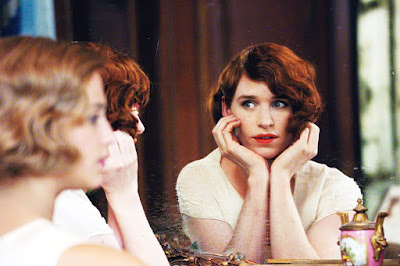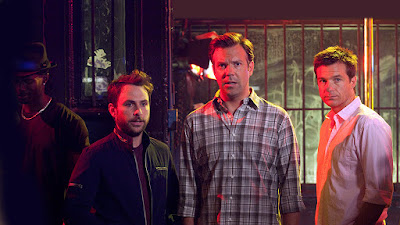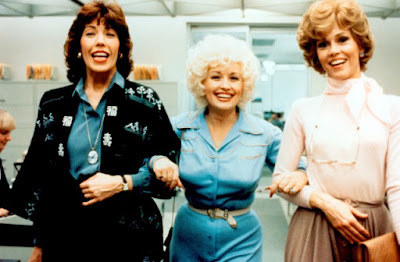Few things calm the turbulent waters of the world better than the presence of a good movie. They are an act of release, a culmination of visceral desires to liberate audiences from the confines of ordinary existence in order to propel them towards mental or emotional enlightenment. Good ones can educate about the paths we neglect to walk, but greater ones will show us the way to them, like roadmaps to a destination of one’s better self. And in more paradoxical scenarios, some can even rouse the fires of rebellion burning within, giving us windows into places and people that are on the razor’s edge of negative extremes. A balance of both is key in establishing some level of connection to our personal structure, and who would we be if we didn’t know how to deal with the downtrodden as equally as we do with the fantastic and absurd?
Thursday, December 31, 2015
Tuesday, December 29, 2015
Lessons from Criterion:
"The Exterminating Angel" by Luis Buñuel
"When the spider dies, the web unravels."
The enormity of collective alienation is one of many central themes driving Luis Buñuel’s “The Exterminating Angel,” and within that suggestion exists a mystery of unfathomable density that continues to incite varying degrees of confusion and dread, sometimes in shared measures. What gives it a decidedly potent edge has less to do with the conceptual audacity of the idea and much more to do with the delivery. Nothing going on in the film – save for key dialogue exchanges that occasionally frame the crisis – comes from a dependable perspective; like witnesses twisted by the absurdity of a predicament, the camera sees things as if displaced from certainty, and the screenplay relays details in broad strokes that merely imply what might be occurring. Are there supernatural elements at play? Is the title, a biblical reference, inferring greater energies are at work? Or are there only simple explanations staring back at us dressed up in the misleading strokes of minimalism? Because so little of what occurs to this ensemble of characters happens in a conventional sense, there is no clear way to decipher agendas, reasoning or solutions. Our eyes meet the gaze of a screen that stares back with a resilient poker face, and sparse are the opportunities for us to gauge the general intention – assuming it amounts to something so easily classified.
The enormity of collective alienation is one of many central themes driving Luis Buñuel’s “The Exterminating Angel,” and within that suggestion exists a mystery of unfathomable density that continues to incite varying degrees of confusion and dread, sometimes in shared measures. What gives it a decidedly potent edge has less to do with the conceptual audacity of the idea and much more to do with the delivery. Nothing going on in the film – save for key dialogue exchanges that occasionally frame the crisis – comes from a dependable perspective; like witnesses twisted by the absurdity of a predicament, the camera sees things as if displaced from certainty, and the screenplay relays details in broad strokes that merely imply what might be occurring. Are there supernatural elements at play? Is the title, a biblical reference, inferring greater energies are at work? Or are there only simple explanations staring back at us dressed up in the misleading strokes of minimalism? Because so little of what occurs to this ensemble of characters happens in a conventional sense, there is no clear way to decipher agendas, reasoning or solutions. Our eyes meet the gaze of a screen that stares back with a resilient poker face, and sparse are the opportunities for us to gauge the general intention – assuming it amounts to something so easily classified.
Sunday, December 27, 2015
Star Wars Episode VII: The Force Awakens / ***1/2 (2015)
“The Force Awakens” begins with the same note of wonder that first roused audiences of “Star Wars” to excitement four decades ago: with a lone shot of space interrupted by the quiet arrival of a menacing ship. It glides into view just as abruptly as many others do in modern science fiction epics, but one belonging to George Lucas’ world of Jedis and Sith lords carries a certain chord of prominence: it means that viewers are once again being enticed by places and characters they have come to regard with the utmost enthusiasm. That’s because the very existence of this series represents two very important landmarks in modern cinema: 1) the birth of the notion of movie blockbusters; and 2) the most thorough expansion of our moviegoeing imaginations, which had previously been limited to the narrow visions of a film industry not yet revolutionized by plausible special effects. Some often wonder how any singular sensation could persist for so long and so consistently, but it has never faded from memory, and now comes a seventh chapter in a series that refuses to wander quietly into the night, even as the experience of going to the theater has broadened to provide countless offerings just as ambitious.
Tuesday, December 22, 2015
The Danish Girl / ***1/2 (2015)
The first appearance of the mysterious Lili Elbe occurs at a public social in the Danish suburbs, where locals have turned out to engage one another in sumptuous discussions about art. Her friend, the talented Gerda (Alicia Vikander), is attempting to break into this medium, but is facing a steep challenge: she paints human portraits, and such material is seen as blatantly ordinary for potential investors. As she passes through the scene in a gentle sweep of charismatic involvement, men stare at Lili like sharks circling a fresh catch. No one has seen her before, and it is scarcely a wonder as to why they are so enraptured: aside from being extremely beautiful, she is also incredibly shy and nervous, which seems to add fuel to their burning passions. It never dawns on them that the woman they are gazing at with lustful insinuation is actually a man, a well-known landscape artist rising quickly to the peak of his potential just as he begins questioning the nature of his own identity. Do they quietly know the reality, or are they looking only through the lenses of false pragmatism? And when a handsome stranger (Ben Whishaw) offers to whisk her into a private setting for an opportunity to get to know her, is his intrusive dialogue an admission of comprehension, or is he oblivious to the truth?
Saturday, December 19, 2015
Macbeth / **** (2015)
Shakespeare’s grim and challenging “Macbeth” is not a story for the easily rattled, and rare is the movie adaptation that is able to comprehend the depth of those principles in the language of thoughtful cinema. Greater interpretations of his work don’t bother conforming to narrowly defined purposes, but they are often elusive; for many, the bard’s paradoxical implications are told in a custom that violates the quintessential structure of movie narrative, and thus present obstacles too great to overcome. Those who have become fluent in his teachings have somehow grappled those boundaries into an arsenal of bendable values, and on occasion we will even encounter a retelling that rises above those conventions (two of the more recent are Julie Taymor’s “Titus” and Branagh’s “Hamlet,” easily the benchmark). But if they are the byproduct of years upon years of intense research and careful comprehension, then that club must now welcome Justin Kurzel, who has not made a great film about the Scottish king but has essentially crafted the defining interpretation of his long and horrifying descent into madness, and done it with production wizards that perceive the details through a texture of grand artistic value.
Friday, December 18, 2015
Sisters / **1/2 (2015)
Siblings are frequently at each other’s throats in the premises of mainstream adult comedies, but when you cast Tina Fey and Amy Poehler in the roles, it’s almost impossible to bow to those conventional pressures; they are too likable to be seen in any capacity beyond lighthearted antics. That’s exactly what one can come to expect of “Sisters,” their newest film, which tells the story of a pair of 30-something women – one slutty and irresponsible, the other accomplished and pathetic – who are asked to unite in order say goodbye to a lifetime’s worth of old memories, and wind up creating a slew of chaotic new ones in the process at their childhood home. Because their individual – and mutual – dexterity is so well-known, one could hardly expect anything less. That is just as much of a routine as it is a platform for wild and crazy gags, of course, but the virtue of theirs is that they bring a certain infectious edge to the table, inspiring just as many smiles as chuckles. They are also consistently funny without forcing the attempt, and nearly every moment that they are on screen is one of blissful delight.
Monday, December 14, 2015
Home Alone / *** (1990)
A holiday movie that encourages us to recognize details as nostalgic projections is a priceless commodity, but an endeavor that embellishes them into blatant absurdity can carry a charm all its own. One could charge Chris Columbus of understanding that prospect with clairvoyant accuracy when he made the notorious “Home Alone,” especially considering how it has endured for so long in public favor. Though it was clearly made and released with cynical intentions on part of a money hungry movie studio, the eyes of overzealous young dreamers are drawn incessantly to its simplistic values even now, and as one generation of mischievous kids grows beyond the cartoonish frame of reference of the material, another simply arrives to replace them. Two decades after it dominated the international box office, the idea continues to carry an almost parasitic charm, as if the underlying subtext of young Kevin McCallister’s military-style antics are like narrative devices of adamant rebellion that refuse to fade quietly into the night. That doesn’t place it beyond the restriction of its narrow intentions, but it does give it an edge that holds certain nostalgia over us today, especially as the awareness becomes clearer that good holiday films tend to have no meaningful shelf life.
Sunday, December 13, 2015
Krampus / *** (2015)
“Krampus” begins with a potent shot of irony, in a slow-motion sequence where cheerful holiday music plays over the questionable antics of angry retail shoppers stampeding through a sale. Their faces divulge the intoxicating dangers of commercialism, and the employees exhibit fear and injury with almost comical severity. To the director, this is what Christmas time has become – a display of extreme contradictions, in which the implication that good tidings must come in the form of expensive material possessions has changed our outlook to one of abundant pessimism. You wouldn’t ordinarily suspect that kind of forethought to worm its way through any sort of holiday movie in this day and age, but it is there, I am sure, to underline his more sensational motives. The characters in this movie are ready to drop the formalities of tradition and come out swinging against one another – even in the context of Christmas get-togethers – but a listening ear from beyond has picked up on that frequency, and is ready to unleash an arsenal of its own horrifying doing. Nothing is worse during the holidays then one’s loss of hope, because it brings out the shadows of devious energies ready to unravel all that we take for granted.
Friday, December 11, 2015
Saving Christmas / zero stars (2014)
He begins his diatribe as most do in the precursors to holiday yarns: seated at the front of a crackling fire, a Christmas tree in the backdrop and stockings hanging from an elaborate mantle façade. His smug, unsavory smile cloaks a disgust for inclusive perspectives, and his words – clearly improvised – rattle on about the contemptuous nature of differing opinions. No, these are not the joyful invites into a world of good cheer and worldly connections; they are the damning indictment against any person in the audience who has ever shared a more broad view of the holiday meaning, especially one that includes considering anything beyond fundamental Christian values. If these warnings had come from anyone less devoted to the cause than Kirk Cameron, we might have just assumed innocence, or even irony. But knowing that they belong to this, a self-proclaimed authority of the teachings of Christ, is to find oneself trapped in the embrace of a self-indulgent ideology. The concept itself would be dimwitted if it weren’t so dangerous.
Wednesday, December 9, 2015
Disturbia / *** (2007)
The main character in Alfred Hitchcock’s “Rear Window,” a photographer with voyeuristic curiosity, was by many measures the most sophisticated of modern movie heroes. An everyday observer whose intrusive behaviors mirrored the sentiment of curious moviegoers, he made the sorts of discoveries that have become the anticipation of the audience, and countered the reveals with a clever brand of wisdom, caution and investigative proficiency; by all reasoning, he seemed to follow a routine that is as ideal as it is effective. So potent was his prowess for studying the full disclosure of others that when it came to building the chutzpah of protagonists in similar stories over the years, most filmmakers turned to him as their primary source of inspiration. But seldom before – save for fringe endeavors and television remakes – has anyone made an active attempt to retell the entire underlying experience of L.B. Jefferies in any implicit detail. There simply has been no need for it. And in the age where his initial discoveries play like minor offenses compared to what is possible, why would anyone spare the time to reach that far into the standards of old for anything, least of all a mere characterization?
Sunday, December 6, 2015
Horrible Bosses / *1/2 (2011)
“Horrible Bosses” begins with a smart premise about a group of friends exacting revenge on a slew of corrupt professional supervisors, and then slowly but gradually descends into the meandering embrace of excess, stupidity and tragic comic timing. By this point, you recognize the trend more than you should: it has almost become customary in movies like this for friends who are down on their luck to get involved in some kind of conflict that causes them to react with eccentric flair (not to mention dialogue that could be uttered by any simpleton standing in line at a convenience store). What provokes filmmakers to still find those generic quirks amusing is its own issue – but why did actors like Jason Bateman, Colin Farrell and Kevin Spacey, so clearly in a league of their own, agree to partake in such a shoddy exercise of those qualities? Did story conferences leave anyone optimistic that they were dealing with material that was funny, or did they just assume that the charisma of their co-stars would be enough to offset the reality that the jokes were trying way too hard?
Friday, December 4, 2015
Nine to Five / ***1/2 (1980)
Audiences leap at the chance to share a bond with characters that mirror their everyday struggles, but few have been quite as focused (or resonating) as those that occur in the workplace. Colin Higgins’s “Nine to Five,” one of the more popular films set in office culture, is as relevant in that sentiment as it is funny. Many ought to have expected it to fade into oblivion following a mildly successful response back during its initial theatrical run, but like a stampede of epiphanies it carries on even now, rousing its viewers to assertive cognizance and inspiring a plethora of filmmakers to mirror the perspective (one of the more famous, Mike Judge’s “Office Space,” can probably be seen as an indirect remake). To the audiences of the time, the three central figures were the informed embodiment of feministic measurement; today; their situations and dialogue are reflections of the tiresome grind that has become the average American workforce, a routine of artifice and pleasantries that mask an inner disgust for corporate politics. It is one of those rare movies that goes beyond judgment because of how accurately it forecasts the nihilism in our collective professional morale.
Subscribe to:
Posts (Atom)












